90`s Southern Gothic Country Music: The Counterpart to Nirvana? Pt. II
''That’s the price I pay for playing the music I truly love and if I get lost to history because I played the music I loved, I’ll go down every time'' - J.D. Wilkes
In the last posts I discussed The Denver Sound and gothic country music, which is a full of liturgical language and thematic. David Eugene Edwards of 16 Horsepower and Wovenhand combines liturgical texts with gothic and country music. He explains that: ‘‘music is not sacred. My music is not sacred‘‘. However some of the religiously affiliated do not agree with alternative music. Protestant evangelist David J. Stewart condemns all goth music. Not only taking a stand against goth but punk, grunge and emo music:
‘‘Goth is a deplorable type of heathen culture that glorifies everything that is vile and unholy…Goth glorifies things that are sick, nasty, improper, freakish, and downright demonic. Goth is NOT just the music. In fact, not all goths listen to goth music.
The term ‘goth’ refers to all categories of gothics, from emo ‘goths’ to black metal ‘goths’ to vampire ‘goths; from thrasher ‘goths’ to punk ‘goths’ to industrial ‘goths.’ ‘Goth’ is just a word the media uses to group a certain type of people together. The goth culture includes emos/ punks/ Wiccan witches/ self-abusers/ thrashers/ grungers/ heavy metallers, et cetera. This includes the Marilyn Manson, AC/DC, Smashing Pumpkins, Van Halen and Ozzy Osbourne crowd as well’’ (Spracklen and Spracklen, 2018, p.111,112)
He infers that the issue is not the music but the ideology of goth, as not all goths listen to goth music. He compares grunge, thrash, punk and emo fans to Wiccan witches. Ultimately, arguing that these people are anti-Christ as Wicca is the largest and most influential form of modern paganism. Wicca has also been used in non-religious and non-pagan forms to signify witchcraft. However, not only these forms of music are sinful, but Christian rock and pop music for him are ‘‘misguided and immoral’’(Spracklen and Spracklen, 2018, p.111). Whilst some are sceptical of goth, grunge and other forms of alternative music, frontman of the gothic country band The Legendary Shack Shakers explains about their own music that:
‘‘It’s not dreary music for suicidal girls. It’s for the tougher people who are looking for something meaningful in the Southern roots’’ - J.D Wilkes (Oksenhorn, 2006)
For this post, I want to again return to gothic country music, which subverts stereotypes of alternative music. This time focusing on bands from the South. I want to talk about the gothic country approach and the meaning of music for The Legendary Shack Shakers, The Baptist Generals, American Sinner and The Victor Mourning/Swarme of Beese.
The musical scene of 90`s Denver is particularly interesting for it`s alternative take on Christian rock and music in general. As discussed before, contemporary Christian music ranked ‘’almost a billion dollars annually by the late 1990s’’ (Stephens, 2018, p.25). Whilst, at the same time, the 1990s started with the mainstream surge of grunge music which is for most part nihilistic.
Like discussed in the previous posts, David Eugene Edwards is the key figure in the Denver gothic country scene and his band The Denver Gentlemen formed in 1988. Whilst, back in Seattle Soundgarden formed in 1984 and Nirvana formed in 1987. Both grunge and gothic country formed around the same time period. Grunge music is not religious, but melancholic, self-deprecating, and often it discusses suicidal ideas. It is acceptive of defeat and romanticizes it.
Grunge is not only lyrically dark but musically. One of the best examples of this is Soundgarden`s ‘‘4th of July’’(1994). It sounds heavy and ominous. The song lyricises that ‘‘everywhere no one cares, the fire is spreading; Down in the hole, Jesus tries to crack a smile, Beneath another shovel load’’ and ‘‘I thought it was the end, Thought it was the 4th of July’’. At the same time this music is political, with the mention of U.S Independence Day.
On the other side, The Denver Scene is also dark and powerful sound wise, however it discusses sin and redemption. This can be heard in 16 Horsepower`s ‘‘Dead Run’’(1997). Also, ‘‘4th of July’’ is lyrically crafting a story , which is a common technique in gothic country music, for example Jay Munly. You can check out these previous blog posts about gothic country, grunge, rock and all the above here:
*Also, if you are interested in literature which discusses religion and rock music, I would highly suggest checking out The Devil’s Music: How Christians Inspired, Condemned, and Embraced Rock ’n’ Roll (2018) by Randall J. Stephens.
The Legendary Shack Shakers (Murray, Kentucky)
Jello Biafra`s label Alternative Tentacles highlights that the band explode the “Southern Gothic” concept with their album The Southern Surreal, which also features Billy Bob Thornton, and Jesus Lizard guitarist Duane Denison.
Whilst frontman J.D. Wilkes insists on billing the band`s style as “gothic”, he explains that they are not playing goth music: ‘‘I don’t think we’re goth in the sense of veils and black clothing, people in perpetual mourning, funereal mode, It’s the traditional term, rather than the trendy, Americanized, fad version of it’’(Oksenhorn, 2006). Instead the band is Southern Gothic – all about Southern mythology, religion and politics. Exploring the beauty and grotesque in the traditions of the South. “My interests are in folklore, and every state has the same kind of scary stories. The local legends,” he said. “It might be the religious stuff that scares Northerners more.”(Wedel, 2009).J.D. Wilkes had a catholic and Protestant/Baptist upbringing.
As discussed in Pt. I, the storytelling approach to song writing is common in this genre. I discussed this about Denver`s Jay Munly. This is also the case with the Legendary Shack Shakers, for example ‘‘Blood On The Bluegrass’’(2003).
Also, “Somethin’ in the Water”(2006) tells the true story of the plutonium contamination of the water in Paducah. Uranium workers at the federally owned plant were exposed unknowingly to the contamination. The contractors hid the facts of contamination, during the mid-1950s to the mid-1970s. Keeping this fact from the workers, even as employees in the 1980s began to notice a string of cancers. The song explains that there`s ‘‘Somethin' weird in the water,
killin' your sisters and your brothers’’.
‘‘(So while you're) sneakin' gold out of hydrogen bombs,
Platin' pistol grips and carryin' on,
Your boss is doin' the exact same thing,
Suckin' atoms out of your sewage drain’’
He explains that the band were culturally deprived Western Kentucky kids. Whilst there was rockabilly, bluegrass and Western swing music, in his home town Paducah, one needed to know where to find it. About America`s disconnection from the cultural roots, Wilkes explains that “we’ve been deprived as a nation, anywhere there isn’t a Bohemian scene”(Oksenhorn, 2006). Furthermore about roots music he remarks that:
‘‘It was all scoffed at and dismissed and replaced by hip-hop and boy bands now, and in the ’80s by disco and corporate rock…The only way to get people to take it seriously is not to play roots music, but to play some kind of art rock…That’s the price I pay for playing the music I truly love. I love playing these classic, time-honoured musical histories. And if I get lost to history because I played the music I loved, I’ll go down every time.”(Oksenhorn, 2006)
Some fun facts:
Wilkes is also a skilled artist and author of The Vine That Ate the South (2017) & Barn Dances & Jamborees Across Kentucky (2013). He also is in JD Wilkes & The Dirt Daubers and Silver Jews.
Their song ‘‘RAWHIDE!” (2021) features Jello Biafra.
Legendary Shack Shakers opened for Dallas, Texas rockabilly-punk Reverend Horton Heat in Aspen at the Belly Up (Feb. 26, 2006). Reverend Horton Heat has released Smoke 'Em If You Got 'Em (1990),The Full-Custom Gospel Sounds of the Reverend Horton Heat (1993) and Liquor In The Front (1994) on Seattle grunge music`s epicentre Sub Pop records. In case you missed it, check out the Swing Revival of the 90s!
The Baptist Generals (Denton, Texas)
Likewise, The Baptist Generals have ties with Sub Pop. Originating from Denton, Texas, the band ‘‘are purveyors of some of the scariest acoustic guitar mangling you’re likely to hear’’(Sub Pop, 2003), explains Sub Pop records. Their EP Void Touching Faster Victuals (2002) and both albums Jackleg Devotional To The Heart (2013) & No Silver / No Gold (2003) have been released on Sub Pop. The Baptist Generals can be ‘‘likened to the "gothic country" counterpart to Nirvana’’ and they are a combination between country and grunge’’ (Baptist Generals,2014).
Frontman Chris Flemmons before starting The Baptist Generals was in Poor Bastard Sons. He is the son Fort Worth Star-Telegram Travel Editor, Texana author, and Texas historian, Jerry Flemmons.The band was ‘‘was trapped in a “cornball country scene” with “cosplay-type characters showing up to shows in Western swing outfits,” and he wanted nothing to do with it’’(Rodrigue,2019). Unlike Poor Bastard Sons, The Baptist Generals ‘‘was a little angrier and had some punk rock ethos to it, even though it was Southern gothic or whatever”(Rodrigue, 2019) concludes Flemmons. On ‘‘Feds on the Highway’’(2003) he sings :‘‘I feel true danger for the children of the world, I'm prophesying and my mind is on fire’’. And encourages to:
‘‘Don't hold inside your heart all the things that trouble you so,
What's in your heart, turn it inside out
And write it in your log of hope’’
American Sinner (Washington, D.C)
Just like Shakers` “Somethin’ in the Water”(2006) tells a historical story, the same is with American Sinner. Vocalist Scott Trowbridge explained in 2014 for Swedish Embassy Of Gothic Country that the band`s lyrics go through many revisions to ‘‘include obscure historic references’’(American Sinner, 2014).The band has been labelled as gothic americana, gothic folk, gulag rock, death accordion, accordion & violin death metal, accordion music for people that like goth, punk, grunge and folk. Just like the Shaker`s, American Sinner is not afraid of making a political statement with their music. Trowbridge clarifies :
"I have seen a lot of unhappy things as I've worked in child abuse and neglect prevention for many years. I've also seen the resilience of people, which is also inspiring, but for me at least, doesn't translate to positive sounding things, even if I would characterize them as positive on the whole.
Some of the horrible things I see are what you'd expect from knowing that, physical abuse, sexual abuse, etc.
But part of the depressing nature of that is how low a priority people are in U.S. politics. We spend more on keeping rich people rich here than on making sure kids have enough to eat or decent schools. That is what the song Temptation is about...and eminent domain."(American Sinner, 2014)
The song is in part about eminent domain actions in the early 2000s in Washington, D.C and references Garcia Marquez’s novel 100 Years of Solitude (1967). The song references the suicide of José Arcadio, vocalising that:
‘‘I see your slow starvation ways.
My temptation to turn you inside out;
I seen your shape shifting ways.
You go on and anoint yourself now,
The devil in the lamb's clothes as the blood runs down;
You say let them eat cake. My temptation to toss you in bound,
I say let them eat pork as the blood runs down.’’
The Victor Mourning/Swarme of Beese (Austin, Texas)
The band consists of Stephen Lee Canner, Lynne Adele and Stefan Keydel. They have released ”A Handful Of Locusts” (2010) and ‘‘Kill a Spider’’ (2013). In 2021 the band renamed itself to Swarme of Beese, and have released Fruits of the Golden Land (2023) and Backwoods of My Mind (2022). Their new album Fruits of the Golden Land (2023) is full of sonic postcards from a mythical road trip, as the band notes. These stories ‘‘are razor-edged and real, steeped in history and imbued with spirit of place, with an American gothic undercurrent’’. About the Southern roots and approach of his dark song writing, Canner explains:
“I come from a long line of southern mountain people, and music has always been a big part of that culture. The music of the southern mountaineers often focuses on death, longing, sadness and tragedy, which were all part of everyday life in the days when that music developed.
In my earlier days, I would write songs to fit whatever band I was in at the time (post-punk, 1960s garage, glam), but when I was home alone just working on my own ideas, I would write these plaintive mountain-flavoured tunes. In time I realised that these dark little acoustic songs just fell out of me naturally. They are in a literal sense a part of who I am. So it’s not so much about loving a particular style of music, it’s about having no choice in the matter.”(Dorman, 2012)
It`s particularly interesting how Canner explains that the dark music that he writes is a natural expression of himself. It`s a part of himself, his culture and his upbringing. ‘‘Zachariah’’(2010) tells the story of death and tragedy of a boy named Zachariah, who ‘‘got his name in the public eye, sinned so bad that he got to fly…nature of a sin where the stories don`t tell, everybody knew his name’’. This song follows the storytelling approach reworking the Greek mythology story of Icarus. He is the son of the craftsman Daedalus who perished by flying too near the Sun with waxen wings. The song in the choruses repeats ‘‘go on fly Zachariah’’ and ‘‘take it to the sky, you can`t get any higher, watch out for the sun’’.
Just like music, reading daily exercises the brain, improves sleep and reduces stress, so why not read some more?! Check this out:
Republicans And Democrats Against Grunge: Parents Music Resource Centre (PMRC)
Previously, as discussed, the financial crisis and President Ronald Reagan's Reaganomics (READ HERE, READ THIS OR THAT) had challenged the middle and lower American class systems. However, the promotion of self-indulgence and pleasure, promoting freedom, choice and self-centrism with beneficial outcomes also resulted in negative factors for society.
The Global Music Diplomacy Initiative
The Global Music Diplomacy Initiative made headlines when U.S. Department of State and Secretary of State Antony J. Blinken launched the initiative on September 27, 2023 by performing Muddy Water's "Hoochie Coochie Man" (1954). This is problematic itself, considering the scandals of the Biden administration (Hunter Biden`s sex trafficking charges etc.) …


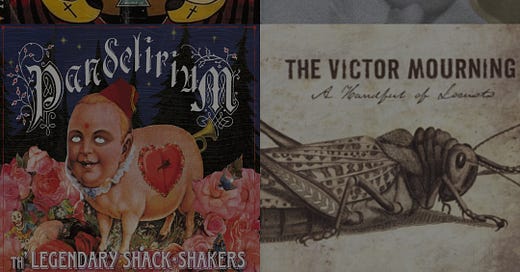


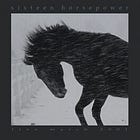

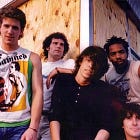
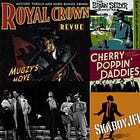
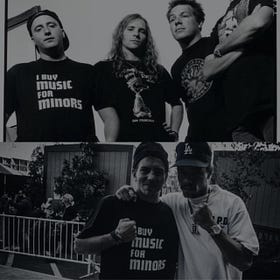
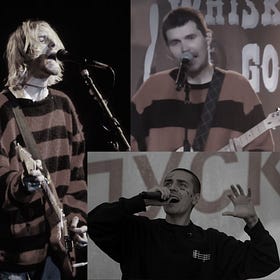
I’ve never heard of goth country! Loved the intro. Btw, Carré of Queen Kwong was raised in a Denver goth club that her parents owned. She might have a story or two for you! She’s on Substack.